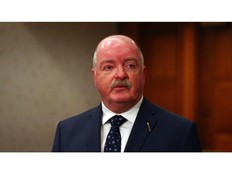Nurses, doctors criticize Tories over missing retention bonuses
Groups sought $140M for incentives

Article content
New Brunswick doctors and nurses are criticizing the Progressive Conservative government for failing to deliver again on retention bonuses in its latest budget.
The government delivered last week a $3.8-billion health-care budget for the 2024-25 fiscal year – up from $3.6 billion budgeted for 2023-24 – but when compared to actual spending for this fiscal year, it only represents an increase of $1.7 million.
The Tories have indicated there will be more spending room this coming fiscal year because Horizon Health Network is slated to eliminate its travel nurse contracts this spring.
“While we appreciate that the elimination of expenses such as travel nurses may allow for certain additional investments, this budget is far from the commitment to health system transformation that health-care professionals were hoping to see,” Dr. Paula Keating, president of the New Brunswick Medical Society, said in a statement.
“In particular, the absence of any significant retention initiatives is surprising, given the health human resource challenges we are facing.”
A consortium of medical professional associations called for $140 million to be included in the budget to “recognize and stabilize” New Brunswick nurses and other health-care workers in accordance with other jurisdictions in Atlantic Canada.
It’s clear to me that the premier is not listening to anything anyone is asking him or saying around him when it comes to retention.
Paula Doucet
Last spring, the Nova Scotia government delivered $330 million worth of bonuses for its nurses, paramedics and other health-care professionals as part of a multi-year retention program.
Under questioning in the legislature, Premier Blaine Higgs reiterated last week his government’s strategy to retain existing health-care workers by focusing on improving working conditions.
“It’s clear to me that the premier is not listening to anything anyone is asking him or saying around him when it comes to retention,” said Paula Doucet, president of the New Brunswick Nurses Union, in an interview.
“If you don’t retain the experienced staff that you currently have in our system, it’s just going to continue to deteriorate.”
Both the nurses’ union and the medical society were part of the consortium that made the proposal.
Last week, Health Minister Bruce Fitch defended his government’s track record on health care, pointing to the net increase of 1,100 licensed practical nurses and registered nurses the province has seen since 2018.
But Liberal health critic Rob McKee said that number could grow “tenfold” with spending on retaining existing health-care workers.
“There are two sides of the equation: recruitment and retention,” he said in the legislature. “The government is ignoring our own people. It’s demoralizing for our workers.”
The New Brunswick government has estimated it would cost $100 million to provide a $10,000 bonus to each nurse in the province, but it hasn’t released an estimate of what that cost would balloon to if it included other health-care workers.
Some new funding contained in budget
A $600-million spending plan had been proposed to the Tories by the consortium of health-care worker groups before last week’s release of the provincial budget.
While the government didn’t deliver that amount, the budget includes $70 million to help Horizon and Vitalité health networks “stabilize and ease pressures” in the health-care system.
In a statement, Keating, who was unavailable for an interview last Thursday, described the figure as “barely sufficient to maintain the status quo” with the two regional health authorities (RHAs).
“The NBMS is concerned that RHAs will be put in a position to rely on finding efficiencies and cutting costs in order to maintain service levels,” she said.
“This has been the approach for many years now, and the strategy is clearly not yielding acceptable results.”
The budget also included $20 million to “improve access to primary care,” including the continued expansion of collaborative care practices.
Keating called the funding “a step in the right direction.” However, she said it was “somewhat concerning” that there doesn’t appear to be rules and metrics governing how the money will be used.
“Hopefully government will take a collaborative approach with stakeholders in determining how best to allocate these funds.”












Postmedia is committed to maintaining a lively but civil forum for discussion. Please keep comments relevant and respectful. Comments may take up to an hour to appear on the site. You will receive an email if there is a reply to your comment, an update to a thread you follow or if a user you follow comments. Visit our Community Guidelines for more information.